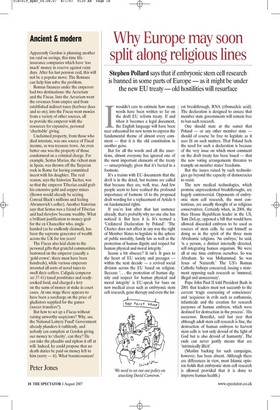Why Europe may soon split along religious lines
Stephen Pollard says that if embryonic stem cell research is banned in some parts of Europe — as it might be under the new EU treaty — old hostilities will resurface Iwouldn't care to estimate how many words have been written so far on the draft EU reform treaty. If and when it becomes a legal document, the English language will have been near exhausted for new terms to express the fundamental theme of almost every comment — that it is the old constitution in another guise.
But for all the words and all the assertions, almost everyone has ignored one of the most important elements of the treaty — unsurprisingly, given that it's buried in a footnote.
It's a truism with EU documents that the devil is in the detail, but truisms are called that because they are, well, true. And few people seem to have realised the profound importance of footnote 18 to the proposed draft wording for a replacement of Article 6 on fundamental rights.
If you're lost after that last sentence already, that's probably why no one else has noticed it. But here it is. It's termed a 'Unilateral Declaration by Poland': 'The Charter does not affect in any way the right of Member States to legislate in the sphere of public morality, family law as well as the protection of human dignity and respect for human physical and moral integrity.'
Seems a bit obscure? It isn't. It goes to the heart of EU society and presages — within the next decade — a revived social division across the EU based on religion. Because `. . . the protection of human dignity and respect for human physical and moral integrity' is EU-speak for bans on new medical areas such as embryonic stem cell research, gene therapy and even the latest breakthrough, RNA (ribonucleic acid). The declaration is designed to ensure that member state governments will remain free to ban such research.
One should state at the outset that Poland — or any other member state — should of course be free to legislate as it sees fit on such matters. That Poland feels the need for such a declaration is because of the very issue on which most comment on the draft treaty has been based — that the new voting arrangements threaten to trample on member states' freedoms.
But the issues raised by such technologies go beyond the capacity of democracies to resist.
The new medical technologies, which promise unprecedented breakthroughs, are hugely controversial. Opponents of embryonic stem cell research, the most contentious, are usually thought of as religious conservatives. Certainly when, in 2004, the then House Republican leader in the US, Tom DeLay, opposed a bill that would have allowed discarded embryos to be used as sources of stem cells, he cast himself as doing so in the spirit of the three main Abrahamic religions. 'An embryo,' he said, 'is a person, a distinct internally directed, self-integrating human organism. We were all at one time embryos ourselves. So was Abraham. So was Mohammad. So was Jesus of Nazareth.' The US's Roman Catholic bishops concurred, issuing a statement opposing such research as 'immoral, illegal and unnecessary'.
Pope John Paul II told President Bush in 2001 that leaders must not succumb to the current 'tragic coarsening of consciences' and 'acquiesce in evils such as euthanasia, infanticide and the creation for research purposes of human embryos, which were destined for destruction in the process'. His successor, Benedict, said last year that although adult stem cell research is fine, the destruction of human embryos to harvest stem cells is 'not only devoid of the light of God but is also devoid of humanity'. The ends can never justify means that are 'intrinsically illicit'.
(Muslim backing for such campaigns, however, has been absent. Although there are differences in view, most Islamic opinion holds that embryonic stem cell research is allowed provided that it is done to improve human health.) But it is not just religious conservatives who lead the opposition. In 2003, Switzerland approved research on embryos. But a coalition of the Church and the Green party garnered sufficient signatures to force a referendum (in which over two-thirds then backed allowing research). The British Green party is also opposed. It argues that, 'Current theory and practice place too much emphasis on interventions at the biochemical and individual levels, too little on the social and ecological. Achieving better health requires a balanced, integrated and holistic understanding and approach.' Try telling a leukemia sufferer about the social interventions which might help him A cuppa with a some friends? A night down the pub?
Powerful opposition, however, coincides with a strong church. It should not therefore be surprising that a country such as Britain, with some of the most ineffectual religious leadership, has some of the most permissive research laws.
The potency of this new technology, and the controversy surrounding it, means that we are heading towards a new division within the EU. With the influence of religious leadership remaining high in many member states, bans on treatment are near certain. A country such as Poland, for instance, will almost certainly continue to ban both research and treatments derived from scientific methods deemed unethical.
Individual member states can ban what they like, but such legislation will be irrelevant when the medical breakthroughs have been made elsewhere. Because whatever the moral rights and wrongs, such bans will lead to a new social divide. We know exactly what will happen when a government refuses to allow medical interventions because of ethical or religious concerns; look at Ireland when abortion was illegal. With these latest breakthroughs, those who can afford to leave their country to be treated abroad will simply buy a return plane ticket.
Bans, when people are free to travel to a country where a treatment is legal, have only one effect: they give freedom to choose to the wealthy and deny it to everyone else. Take sex selection of children which is, in most cases, illegal across the EU. The latest technology means that small amounts of foetal DNA can be examined in a mother's blood just six weeks into pregnancy. A Ychromosome reading means that the foetus is male. The British company DNA Worldwide is now marketing a mail-order test, with an answer guaranteed within a fortnight — well within the abortion framework. In the modern world, bans on such services are whistling in the wind.
There is no easy solution. An EU-wide policy would be undemocratic and as equally unworkable as individual member state bans.
Treatments derived from embryonic stem cell research are coming, imminently, and they will bring untold relief to those whom they can benefit. Banning them may salve consciences but the impact of such restrictions will be straightforward: to reintroduce across Europe a division based on religion. In Catholic and conservative Christian countries which choose to ban, new advances will be available only to the wealthy. Elsewhere, they will be available on the basis of need. The further complication of the free movement of labour, and moves to allow patients to elect to be treated wherever in the EU they wish if they are denied treatment in their own countries, only adds to the complications.
It may be buried in a footnote to the treaty, but the fallout from new medical technology is going to be on the front page before long.
Stephen Pollard is president of the Centre for the New Europe in Brussels.









































 Previous page
Previous page